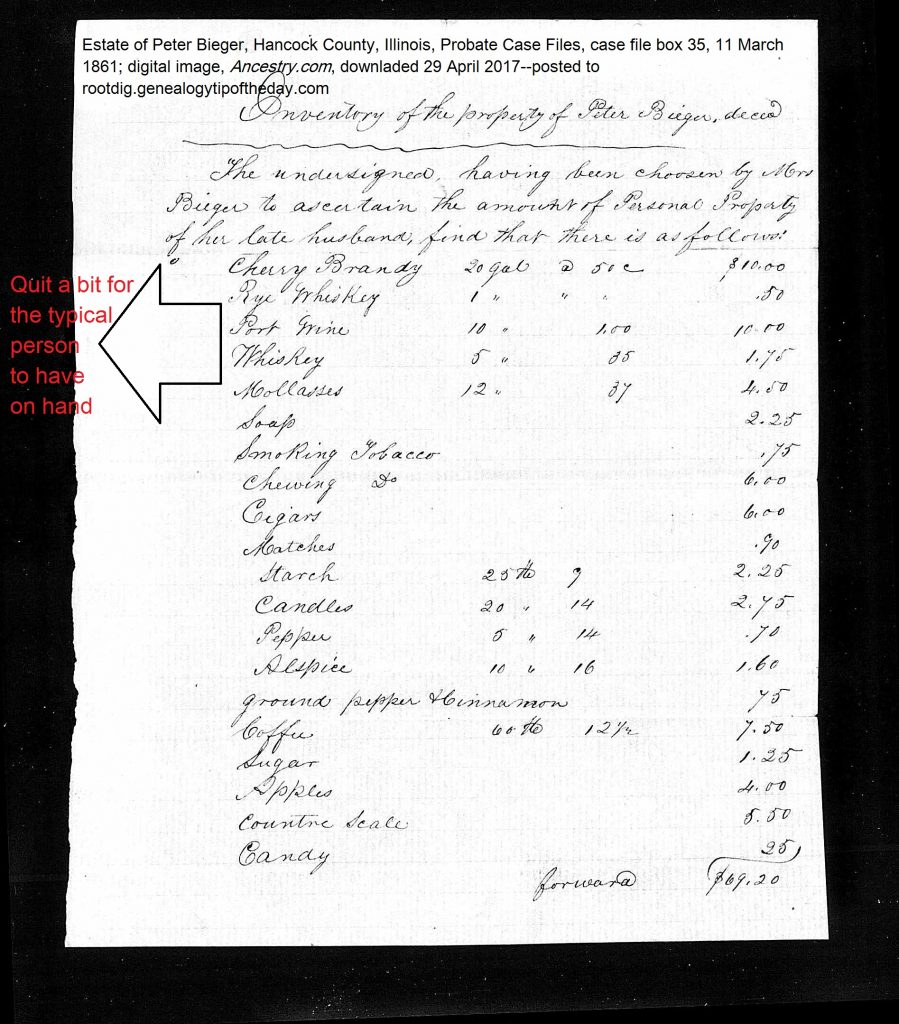There are many things listed in the mid-19th century inventory for the estate of Peter Bieger that the typical person would not have had on hand. At least not in the quantities that Peter Bieger had them.
Thirty-six gallons of alcohol seems to be a bit much for the typical person to have on hand. The inventory is suggestive of running a tavern combined with some type of general store.
The theoretical question is:
does this inventory provide direct evidence of Peter’s occupation or does it provide indirect evidence of his occupation?
Elizabeth Shown Mills in Evidence Explained (page 25, 3rd edition) defines direct and indirect evidence as follows:
- direct evidence “seems to directly answer the research question”
- indirect evidence “does not directly address the research question but can be combined with other information to arrive at an answer or build a case.”
Which begs the question: What’s my research question?
The question would then have to be “What was Peter Bieger’s occupation?” There’s no record that flat-out directly states it. Peter is not listed in any extant United States census that provided occupational information and no other extant records explicitly state what his occupation was. It is the same problem that we have in certain areas of the United States before the 1850 census–no record states the occupation specifically.
And knowing the occupation can help us to distinguish between two individuals of the same name (at least sometimes) or it can help tell us if an ancestor was more susceptible to economic downturns and opportunities.
Would the probate inventory be direct or indirect evidence of Peter’s occupation? Part of me says it would be direct evidence, part of me says it is indirect evidence, and part of me says that it really doesn’t matter what type of evidence one calls it.
It also hinges on our narrowly one defines “direct evidence.” Mills defines it as “seems [my emphasis] to directly answer the research question.” Here’s where the mathematician in me isn’t too keen on the definition of “direct evidence.” I would like a definition that doesn’t hinge on “seems.” That’s pretty vague. What seems to you may not seem to to me and what seems to me may not seem to you. For me, I think I’ll tweak the definition of direct and indirect.
- direct evidence–explicitly answers the research question
- indirect evidence–does not explicitly answer the research question, but can be used with other evidence, legal statutes and practice, and logical reasoning to answer the question
To some that may seem like a tight definition and it is. There’s enough gray area in how records are interpreted and analyzed that my personal preference is to try and have definitions that are as tight as possible.
Now I can view the probate inventory as indirect evidence–because nowhere does it explicitly state Peter’s occupation. Indirectly it does. Classifying something as indirect does not mean it is wrong and classifying something as direct information does not mean it is right. Our analysis of information does that. The classification of information as direct or indirect simply reflects upon the type of statement the information made related to the research question under study.
It’s always worth it to think about the information you have located, how it answers your question, and how to use it to logically and clearly write up your conclusion and argument.
And I bet it can be done without ever using the phrase “direct evidence” or “indirect evidence.”
But at least you thought about it.

4 Responses
Your definitions of Direct and Indirect evidence makes good sense to me. I especially like the indirect definition as it reminds us to seek out the local laws of the time. That could really make a difference in how we interpret the evidence.
This is just one of those definition “opposite combinations that I think works (for me) a little better if one is written pretty tightly and the other is the opposite of it. There’s a lot of gray area in research as it is. I think most people think that all the “indirect evidence” needs to come from actual “records.” It doesn’t.
Does it skew the answer if…you know that he was a serious drinker (how would you know that, but…), if you know that he had just made a batch of brandy? …that he was the best brandy maker in his family and his brothers were counting on it? …that his wife made all the molasses-using recipes for the family? etc. High on our pantry shelves there was oft times some bottles of grape wine. I don’t recall Dad drinking any…unless one of particular brothers-in-law happened to stop to visit. Then he could share and be social. (Actually he was on the shy side and I’ll bet being able to offer it helped him be friendly.) He particularly offered it to mom’s male relatives or the farmers who stopped in for some reason. “Maybe” that’s why it was in Peter’s inventory???
Well…I know his widow was running a tavern after his death (but that’s another story and another blog post).
That’s part of why tightened up my view of direct evidence. The inventory doesn’t really state that he ran a tavern, so I can’t conclude that he did based solely on what the inventory said.
The counter scale, tobacco, and other items suggest he was selling the items, but that’s speculation.
How Peter died is another story as well…